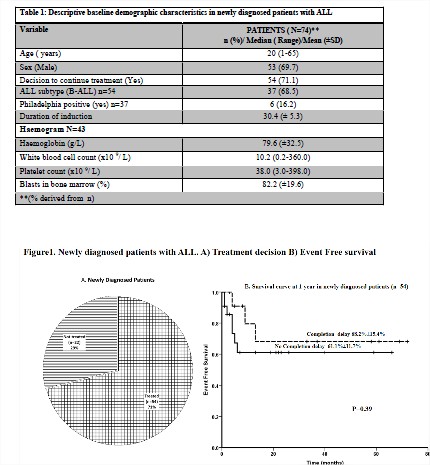Clinical Haematology, Haemato-Oncology and Bone Marrow ( Stem Cell) Transplantation

Contributions
Type: Publication Only
Background
The improvement in event free survival in Acute Lymphoblastic leukemia(ALL) corresponds to advances in chemotherapy and supportive care. However despite these breakthroughs, the intensity of the chemotherapy predisposes patients to cytopenias and infections. These result in a break from the protocol and delay in induction completion. In a resource restricted setting where a major constraint to therapy remains the cost, it is important to analyze the factors to optimize treatment. The impact of duration to complete the initial intensive induction on survival needs analysis.
Aims
To evaluate the clinical characteristics and outcome of patients with a diagnosis of ALL (Burkitt- excluded) admitted at our tertiary care center.
Methods
We undertook a retrospective study on patients with ALL (Burkitt- excluded) admitted at our tertiary care center. Induction chemotherapy consisted of standard induction as in the BFM95 protocol for patients’ ≤15 years and GMALL in the older patients. In addition to the chemotherapy; standard of care diagnostic tests and supportive care was administered to the patients. The data was retrieved from the patient admission records and discharge cards. The collected data was analyzed using SPSS.
Results
A total of 76 admitted patients were diagnosed with ALL during this period. Of these 54 (71.1%) continued with treatment (Fig 1A). The median age of newly diagnosed patients was 20 years (range: 1-65) and there were 53 (69.7%) males. In the treated patients, B-ALL was seen in 37(68.5%).The other baseline features are as depicted in Table1.
The mean duration of induction chemotherapy was 30.4(± 5.3) days. A microbiologically documented infection was seen in 11(20.4%) and the induction was delayed more than the mean duration in 14 (37.8%). With a mean follow up of 15 months, the Event Free survival at one year in those with delay in completion of induction was 68.2%±15.4 and not statistically significant from those without a delay (Fig 1B). A similar conclusion was seen in the pediatric subgroup analysis (Data not shown).
Summary
In conclusion there are challenges in the management of ALL in India. One fourth of the patients decline treatment in view of financial constraints. In those who proceed with induction, there occurs a delay in one third. These delays do not appear to impact the event free survival in ALL. More analysis of prevalent practices will help tailor therapy in resource restricted settings.
Keyword(s): ALL, Prognostic factor, Treatment

Session topic: Publication Only
Type: Publication Only
Background
The improvement in event free survival in Acute Lymphoblastic leukemia(ALL) corresponds to advances in chemotherapy and supportive care. However despite these breakthroughs, the intensity of the chemotherapy predisposes patients to cytopenias and infections. These result in a break from the protocol and delay in induction completion. In a resource restricted setting where a major constraint to therapy remains the cost, it is important to analyze the factors to optimize treatment. The impact of duration to complete the initial intensive induction on survival needs analysis.
Aims
To evaluate the clinical characteristics and outcome of patients with a diagnosis of ALL (Burkitt- excluded) admitted at our tertiary care center.
Methods
We undertook a retrospective study on patients with ALL (Burkitt- excluded) admitted at our tertiary care center. Induction chemotherapy consisted of standard induction as in the BFM95 protocol for patients’ ≤15 years and GMALL in the older patients. In addition to the chemotherapy; standard of care diagnostic tests and supportive care was administered to the patients. The data was retrieved from the patient admission records and discharge cards. The collected data was analyzed using SPSS.
Results
A total of 76 admitted patients were diagnosed with ALL during this period. Of these 54 (71.1%) continued with treatment (Fig 1A). The median age of newly diagnosed patients was 20 years (range: 1-65) and there were 53 (69.7%) males. In the treated patients, B-ALL was seen in 37(68.5%).The other baseline features are as depicted in Table1.
The mean duration of induction chemotherapy was 30.4(± 5.3) days. A microbiologically documented infection was seen in 11(20.4%) and the induction was delayed more than the mean duration in 14 (37.8%). With a mean follow up of 15 months, the Event Free survival at one year in those with delay in completion of induction was 68.2%±15.4 and not statistically significant from those without a delay (Fig 1B). A similar conclusion was seen in the pediatric subgroup analysis (Data not shown).
Summary
In conclusion there are challenges in the management of ALL in India. One fourth of the patients decline treatment in view of financial constraints. In those who proceed with induction, there occurs a delay in one third. These delays do not appear to impact the event free survival in ALL. More analysis of prevalent practices will help tailor therapy in resource restricted settings.
Keyword(s): ALL, Prognostic factor, Treatment

Session topic: Publication Only


